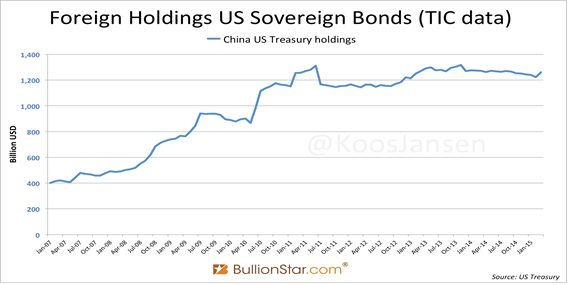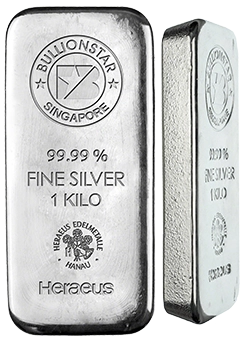The Real Ponzi Scheme
BullionStar was founded on the belief that precious metals generally, and gold specifically, has a central role in the monetary sphere.
Gold is rare, beautiful and has superior metallic characteristics to other metals. Furthermore, gold is durable, portable, divisible, fungible and possesses intrinsic value. This has led to gold being used as money throughout most of recorded human history. One of the strongest historical value propositions of gold as money is that gold naturally emerged as money in different civilizations and continents worldwide, without the civilizations being aware of each other.
Unbacked fiat/paper/credit, and nowadays electronic currency, has a poor track record. Every time it has been tried historically, it has vanished through hyperinflation, war or political decrees. The fiat currencies of today actually have comparatively good track records, but even so, most currencies in circulation a century ago are no longer in existence today and the ones that are have lost 99% or more of their purchasing power.
Still, there’s a lot of gold bashing in the mainstream media as the gold price has fallen slightly over the last couple of years when priced in some of the fiat currencies. Measuring gold in something worthless (fiat currency) is upside down though. Gold has maintained and even increased its purchasing power in the last century, whereas all fiat currencies have lost 99% – 100% of their purchasing power.
Why are there no fiat currency bashing articles in mainstream media? 99% – 100% lost in a century – What a fraud!
Governments are keen, and rightfully so, about going after companies setting up Multi-Level Marketing (MLM) and Ponzi schemes, but always exempt themselves, and their buddies at the central bank, from the rules.
In an MLM scheme, the idea is to recruit downstream marketing participants, known as ‘downline’, so as to generate multiple levels of compensation for the recruiter. This form of pyramid scheme is exactly what we have today with our fiat currencies. Early receivers of newly printed money i.e. governments, central banks and commercial banks are gaining purchasing power, whereas late receivers, read: most normal people, are losing purchasing power.
Today’s monetary system, built on the fragile basis of fractional reserves, is a system that is doomed to go bust. You just can’t borrow forever and in the process create the money out of thin air with no intention of paying anything back.
For the last four decades, we have experienced tremendous monetary inflation and money printing. The worst villain, the United States, has hyperinflated its currency, and although we’ve seen substantial price inflation, it hasn’t been as high as the monetary inflation. The reason for this is the exorbitant privilege the US is holding in terms of printing the reserve currency of the world, the US Dollar. The only reason the system is holding up is the promise of more and more easy credit to infinity.
However, in the end, the problem of too much debt can’t be solved with more debt.
What we are witnessing now is the USD quickly losing structural foreign support as a reserve currency. This is one of the topics I recently covered at BullionStar’s 3 year anniversary.
Governments and central banks around the world are no longer interested in increasing their holdings of US Dollar denominated debt. China, the largest sovereign holder of US debt, has not increased its holdings of US debt for four years and the pattern is the same for other surplus countries.
The only reason the system is still holding up is due to the increase in private non-US demand of US Dollar denominated debt. With many developing markets and their currencies crashing, and with people being conditioned to run to the US Dollar as a safe haven in the short-term, this is the savior for the time being.
The US has a national debt of USD 17,000,000,000,000 and unfunded liabilities of USD 100,000,000,000,000 – USD 200,000,000,000,000. How’s that for a safe haven?
In reality, everyone knows that the US has no credibility, but it’s when people start to act on the knowledge that the US has no credibility that we will see a loss of confidence triggering an avalanche of deleveraging. In previous instances when private support for US debt decreased, there was always foreign government support, but that’s no longer the case.
We are at the beginning of the end. Everything today is pointing towards a deflationary depression, but it’s when, in a deflationary depression, the government starts to buy debt/credit with cash at all costs coupled with a loss of confidence that we arrive at the end stage – hyperinflation. Policy has never and will never allow for deflation.
Why is the government protecting the most fraudulent schemes?
The Monetary Authority of Singapore recently announced plans for enhancements to its regulatory framework for safeguarding investors’ interests.
This is likely an effect of several large MLM/Ponzi gold schemes, like those offered by Genneva Gold, The Gold Guarantee and Suisse International in Singapore, failing during the last 3 years. It’s startling that people still fall for scam after scam with guaranteed interest payouts of 20 plus percent and/or guaranteed gold buy-back prices.
One of the suggested measures in Singapore to be tabled in Parliament during 2016 is that buy back schemes where a seller sells gold with a guaranteed buy-back at an agreed price will be regulated as debentures. This is a very good measure which will hopefully clear the Singaporean market from the scammers for good as it will then be clearly illegal to run unlicensed MLM gold schemes.
At BullionStar, we support these steps taken by the MAS.
A larger question however, is whether government authorities around the world are missing out on the really big Ponzi schemes.
The world’s largest wholesale gold market is the London Gold Market. The London Gold Market is generally very opaque in nature and there isn’t any trade turnover data published, only net clearing volumes. The trend is unfortunately that transparency is decreasing as the London Bullion Market Association (LBMA) forward market makers have stopped publishing the interest rate for lending gold (GOFO), have ceased supplying data on gold forwards, and has chosen not to be transparent about the process used in the LBMA gold price auction.
To give a hint of the trading volumes at the London Gold Market, the most recent data available is from a survey conducted by the LBMA in the first quarter of 2011. 36 of LBMA’s 56 participating members submitted trading statistics for the quarter in question. The average daily trading volume reported, after adjusting for double accounting, turned out to be 170,195 tons of gold for the quarter or 2,700 tons of gold per day. Albeit a staggering number, it’s likely that the real volume is even higher as only 64% of the LBMA’s members participated in the survey.
In the survey, the LBMA stated that “it can also be seen that there is an approximately ten to one ratio between the turnover figures and the clearing statistics".
Using the approximation that trade volume is approximately 10 times higher than net clearing volume (which is conservative as mentioned above) and looking at the LBMA clearing statistics since 2011, there was a slight surge in volume in 2013 inferring a daily average about 3,413 tons of gold traded per day after adjusting for double-accounting. For 2015, volumes have decreased slightly to 2,756 tons of gold traded per day equivalent to about USD 100 billion per day based on the current gold price.
Let’s put this into perspective.
According to the World Gold Council’s report on Gold Demand Trends for the second quarter 2015, the annual global gold mining production for 2014 was 3,133 tons.
The volume traded during one day on the London Gold Market is thus at least 88% of a whole year’s gold mining production. Assuming about 250 trading days in a year, the volume traded solely on the London Gold Market is about 22,000% higher than the world’s annual mining production. And this is a conservative estimation.
The clearing and turnover volumes are nothing short of shocking.
As the London Gold Market, together with the New York market, is the global price discovery market for gold, it’s apparent that physical supply and demand of gold has nothing to do with the price of gold.
Which do you think carries a higher weight when it comes to influencing the price of gold; An increase or decrease of 10 tons of physical gold demand for the Indian wedding season in a quarter, or the 170,195 tons of paper gold changing ownership each quarter in the London Gold Market?
Factors like Indian wedding demand are often cited by media as a cause of price movements, whereas the London Gold Market volumes are never mentioned. Whether demand is high during the Indian wedding season or not does not matter one ounce in terms of price fluctuations. It totally misses the point as the London Gold Market, together with the US/New York market, dominates price discovery.
Physical demand matters in stressing and ultimately breaking the market structure but it does not matter for the (paper) price of gold today. The fundamentals for physical gold are completely separated from the paper price of gold. The paper price of gold has nothing to do with the physical market whatsoever.
The price for physical bullion products is never traded at parity with the paper price. There is always a price premium. When demand for physical gold is increasing, as we have seen over the last couple of months, price premiums are shooting up, diverging the physical price from the paper price even further.
BullionStar deals only in physical precious metals
When putting the above in perspective, it’s clear that the paper trading of precious metals is irrelevant to physical gold and that it is unsustainable in the longer term.
That’s why we at BullionStar have a strong aversion to all forms of paper trading of precious metals.
At BullionStar, we don’t engage, trade or speculate on any paper markets, financial markets, commodity exchanges, commodity platforms or anything similar. We don’t engage in forwards, futures, spot commodity trading or anything of the kind. We never in any capacity work with brokerages of any kind.
BullionStar merely purchases fabricated precious metals items, and to a smaller extent numismatics and jewellery, from wholesalers, mints and refineries and retails these items.
Physical precious metals decoupling
Prices for physical precious metals are in the process of decoupling from the paper price.
The first phase, in which we are now, is that we get shortages of physical bullion.
The second phase is that the physical flow completely dries up and the physical price resets based on physical supply and demand at a higher level few people can imagine today.
Paper gold trading needs to have a functional physical market in the background for keeping up the confidence in the paper trading. When gold supply dries up on the physical market, there will no longer be any confidence in the paper market as everyone will realize that the paper market consisted by nothing but paper gold created out of thin air. As a result the paper gold market will crash and the price of physical gold will reset higher.
When this happens, it’s important that you deal with a bullion dealer without any exposure to paper commodity markets that only deals in physical precious metals.
BullionStar operates with the ideological belief that physical precious metals have important monetary properties and that paper trading is inherently risky. That is why we refrain from participating in the paper trading casino style market. The bullion we offer is physical in nature. We have never and will never offer any unbacked metal, collateralization of customers’ physical bullion, forwards, futures or leveraged trading. All bullion you buy from BullionStar is fabricated, unencumbered, and fully physically allocated bullion.
By Torgny Persson, CEO BullionStar
Popular Blog Posts by BullionStar
 How Much Gold is in the FIFA World Cup Trophy?
How Much Gold is in the FIFA World Cup Trophy?
 Essentials of China's Gold Market
Essentials of China's Gold Market
 Singapore Rated the World’s Safest & Most Secure Nation
Singapore Rated the World’s Safest & Most Secure Nation
 Infographic: Gold Exchange-Traded Fund (ETF) Mechanics
Infographic: Gold Exchange-Traded Fund (ETF) Mechanics
 BullionStar Financials FY 2020 – Year in Review
BullionStar Financials FY 2020 – Year in Review
 Is It Too Late to Buy Gold in 2025? 7 Signs Pointing to Gold’s Next Major Rally
Is It Too Late to Buy Gold in 2025? 7 Signs Pointing to Gold’s Next Major Rally
 Silver’s Coming Breakout: Expert Insights from Peter Krauth
Silver’s Coming Breakout: Expert Insights from Peter Krauth
 The Golden Truth: How Financial Advisors’ Silence on Bullion Could Cost You Your Wealth
The Golden Truth: How Financial Advisors’ Silence on Bullion Could Cost You Your Wealth
 US Announces New Tariffs: What It Means for Your Wealth and Why Gold Still Wins
US Announces New Tariffs: What It Means for Your Wealth and Why Gold Still Wins
 The U.S. Dollar’s Decline: Why Precious Metals Matter More Than Ever
The U.S. Dollar’s Decline: Why Precious Metals Matter More Than Ever






 BullionStar
BullionStar 0 Comments
0 Comments











